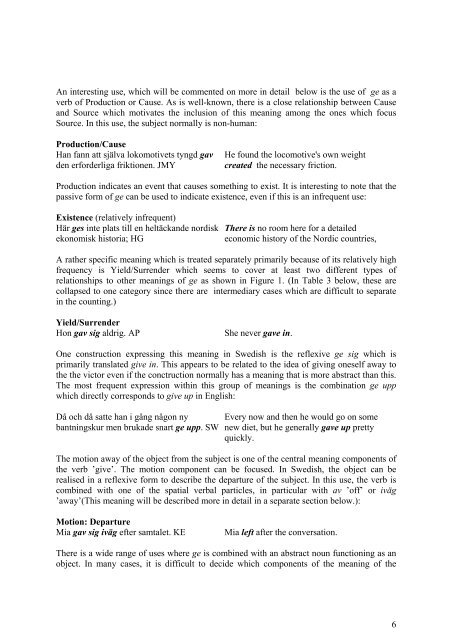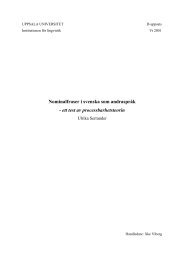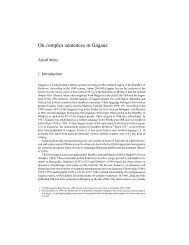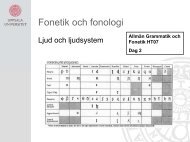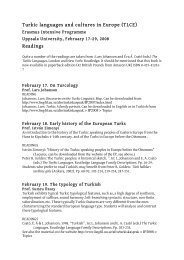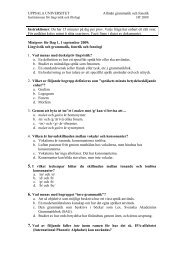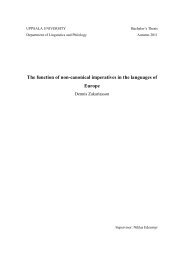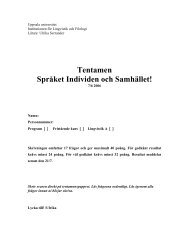The polysemy of Swedish ge 'give'
The polysemy of Swedish ge 'give'
The polysemy of Swedish ge 'give'
Create successful ePaper yourself
Turn your PDF publications into a flip-book with our unique Google optimized e-Paper software.
An interesting use, which will be commented on more in detail below is the use <strong>of</strong> <strong>ge</strong> as a<br />
verb <strong>of</strong> Production or Cause. As is well-known, there is a close relationship between Cause<br />
and Source which motivates the inclusion <strong>of</strong> this meaning among the ones which focus<br />
Source. In this use, the subject normally is non-human:<br />
Production/Cause<br />
Han fann att själva lokomotivets tyngd gav<br />
den erforderliga friktionen. JMY<br />
He found the locomotive's own weight<br />
created the necessary friction.<br />
Production indicates an event that causes something to exist. It is interesting to note that the<br />
passive form <strong>of</strong> <strong>ge</strong> can be used to indicate existence, even if this is an infrequent use:<br />
Existence (relatively infrequent)<br />
Här <strong>ge</strong>s inte plats till en heltäckande nordisk<br />
ekonomisk historia; HG<br />
<strong>The</strong>re is no room here for a detailed<br />
economic history <strong>of</strong> the Nordic countries,<br />
A rather specific meaning which is treated separately primarily because <strong>of</strong> its relatively high<br />
frequency is Yield/Surrender which seems to cover at least two different types <strong>of</strong><br />
relationships to other meanings <strong>of</strong> <strong>ge</strong> as shown in Figure 1. (In Table 3 below, these are<br />
collapsed to one category since there are intermediary cases which are difficult to separate<br />
in the counting.)<br />
Yield/Surrender<br />
Hon gav sig aldrig. AP<br />
She never gave in.<br />
One construction expressing this meaning in <strong>Swedish</strong> is the reflexive <strong>ge</strong> sig which is<br />
primarily translated give in. This appears to be related to the idea <strong>of</strong> giving oneself away to<br />
the the victor even if the conctruction normally has a meaning that is more abstract than this.<br />
<strong>The</strong> most frequent expression within this group <strong>of</strong> meanings is the combination <strong>ge</strong> upp<br />
which directly corresponds to give up in English:<br />
Då och då satte han i gång någon ny<br />
bantningskur men brukade snart <strong>ge</strong> upp. SW<br />
Every now and then he would go on some<br />
new diet, but he <strong>ge</strong>nerally gave up pretty<br />
quickly.<br />
<strong>The</strong> motion away <strong>of</strong> the object from the subject is one <strong>of</strong> the central meaning components <strong>of</strong><br />
the verb ’give’. <strong>The</strong> motion component can be focused. In <strong>Swedish</strong>, the object can be<br />
realised in a reflexive form to describe the departure <strong>of</strong> the subject. In this use, the verb is<br />
combined with one <strong>of</strong> the spatial verbal particles, in particular with av ’<strong>of</strong>f’ or iväg<br />
’away’(This meaning will be described more in detail in a separate section below.):<br />
Motion: Departure<br />
Mia gav sig iväg efter samtalet. KE<br />
Mia left after the conversation.<br />
<strong>The</strong>re is a wide ran<strong>ge</strong> <strong>of</strong> uses where <strong>ge</strong> is combined with an abstract noun functioning as an<br />
object. In many cases, it is difficult to decide which components <strong>of</strong> the meaning <strong>of</strong> the<br />
6


